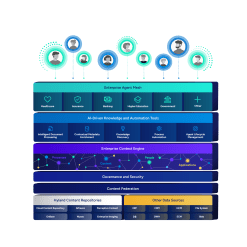What are the risks of ad-hoc file sharing?
Ad-hoc processes are done informally and often on an impromptu basis. Translation: It’s work done without utilizing the sanctioned toolsets, systems or guidelines an organization has set for a specific task.
In practice, ad-hoc file sharing increases risks, such as:
- Sharing confidential information to another recipient via email: If you send an email containing unencrypted plain-text data, anyone with access to the network infrastructure — including the Internet Service Provider (ISP) — can potentially view the contents of your e-mail.
- Engaging with an unapproved, free FTP server to transfer files to another computer: Uploading a file over an FTP site means that it is technically “in the wild,” considering that FTP sites have very limited access control capabilities and provide broader permissions than to view, edit or share documents.
- Storing information in USB sticks to transfer files in-between devices: An infected USB stick that connects with other devices across departments (either intentionally or unknowingly) could introduce malware that leads to data loss or unauthorized access to confidential information.
Users that are freely transferring or storing information using USB sticks may copy or exfiltrate sensitive data without proper authorization — inherently violating the company’s data protection guidelines.
Ungoverned file sharing is risky for a number of reasons. But here’s what damages could look like:
Corporate insider trading and regulatory noncompliance
Consider, for instance, the vulnerable period during which a business is preparing for its Initial Public Offering (IPO).
Confidential information such as revenue projections, sales figures and other nonpublic information could be generated and shared across the organization through personal cloud storage accounts, personal e-mail accounts and other unsanctioned file sharing methods — while everyone else in the organization is none the wiser.
If this is finally brought to light, all unauthorized file sharing practices will be found in violation of securities regulations, such as the Securities and Exchange Commission (SEC) rules, which require strict control over the dissemination of IPO-related information. This noncompliance can result in legal and financial consequences.
Theft of intellectual property
Unapproved file sharing can facilitate the unauthorized access and distribution of trade secrets. This takes the form of everything from proprietary technology to recipes, processes and designs.
On the chance someone from your organization is affiliated with competitor companies, it becomes easy to provide them with unauthorized access to valuable trade secrets and intellectual property files.
This may happen due to personal negligence or lack of awareness, but the fact is that it’s made possible by oversight and loosely implemented guidelines on sharing and storing crucial information.
The loss of Personally Identifiable Information (PII)
Ad-hoc file sharing often takes place through unsecured channels where encryption and access controls are lacking. Files stored on an employee’s personal hardware (USB sticks, employee laptops, etc.) are not secure either and could be compromised if their device is stolen, misplaced or even connected to unsecured networks that leave them open to self-propagating malware.
Data breaches could risk exposing information such as names, addresses, social security numbers, or financial information. Interceptors can use the exposed PII to commit fraudulent activities, such as financial transactions or identity theft.
Sharing PII without proper authorization and security measures can lead to violations of data protection regulations, such as the General Data Protection Regulation (GDPR) or the California Consumer Privacy Act (CCPA).
National security threats from leaking classified information
Consumer-grade applications prioritize ease of use and accessibility, but this can be at the expense of security measures. This lack of focus can create vulnerabilities that can be exploited to access the data of constituents, diplomatic communications and other forms of classified data.
Government agencies, for example, have a responsibility to protect national interests and comply with data sovereignty regulations. By using third-party consumer-grade applications or allowing employees to freely exchange files over email, there is a risk of data being stored in jurisdictions that may expose the data to foreign entities.















